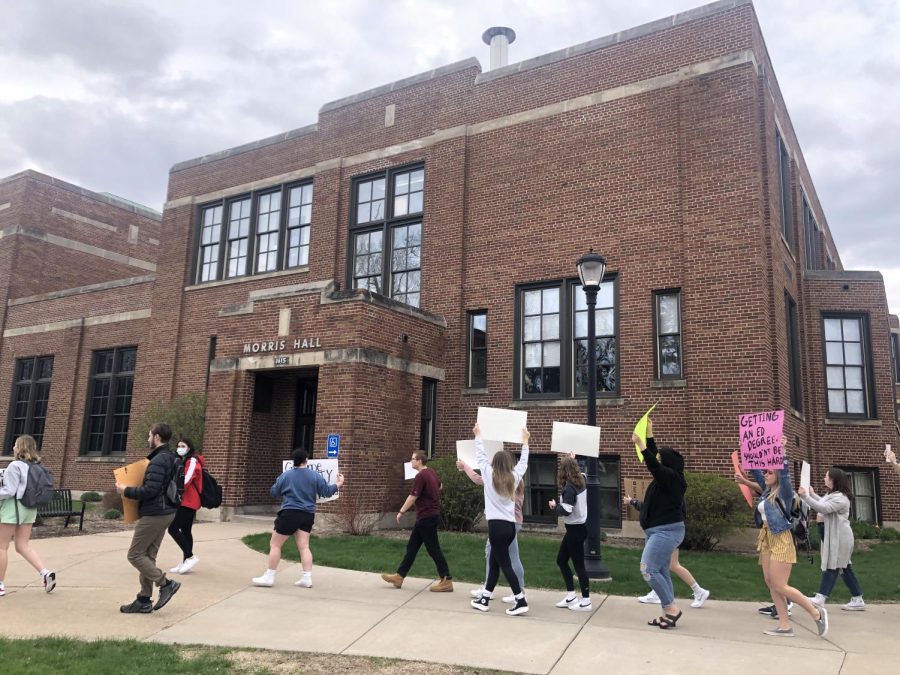Letter to the Editor: The bleak reality of the School of Education
May 16, 2023
For the past two years or so I served as a School of Education (SOE) senator for the University of Wisconsin-La Crosse Student Association (SA). I started right when the issues with the SOE started, right when students were being told to transfer, take a gap semester, or change majors because they didn’t get a field placement, setting students’ graduation dates back.
On top of that, there’s the iPad requirement, homeless student teachers, Educative Teacher Performance Assessment (EdTPA) and Foundations of Reading Test (FORT) requirements, and distances students drive without any kind of compensation. I wanted to get to work immediately, I had so many ideas to share.
As a senator, I had the opportunity to meet and work with a ton of individuals; I got a seat at the table at Dean Wycoff-Horn’s Dean’s Student Advisory Committee (DSAC); I even had biweekly meetings with Dean Wycoff-Horn for some time.
I got to pitch all of the ideas I had. All were shot down. I came up with more. Nothing. I left each meeting feeling worse about my place on this campus. I felt like a failure – useless.
A pattern emerged quickly. Whether I’d ask a question or pose an idea for a potential solution, I was always met with – actually, many times I was interrupted by – a flurry of fallacious, rambling explanations, lame excuses, and misplaced blame for each problem: the iPad requirement is apparently all the faculty’s fault and the administration can’t do something about it until our professors do; the iPads wouldn’t be hated so much if people just used them more, even though they cost hundreds of dollars, which isn’t a problem at all for poor college students who must simultaneously pay for tuition, food, and rent; the lack of placements has nothing to do with the relationships with cooperating schools or the amount of positions we have to work with those schools, but it has everything to do with the teacher shortage (fun fact: Viterbo teacher-candidates get into classrooms comfortably and timely); students actually didn’t want to participate in any of the solutions the administration has posed in the past, which conveniently all took place before my time here began four years ago, so I wouldn’t know about that.
Needless to say, I found these meetings more and more unproductive, eventually avoiding them altogether. Turns out that being gaslit isn’t very fun. It tends to make one internalize each failed proposition and turn the blame inward. Determinately, my attendance at these meetings wasn’t valued very much. Nothing I said was taken seriously, that much stands clear for me to see. After all, I had proposed an alternative to the iPad requirement over a year ago that made laughably minimal progress.
The alternative I proposed was a minimum-specifications requirement or suggestion. Many other universities follow this policy. Basically, the SOE would lay out the bare-minimum device requirements needed to succeed in their programs. Students would just prepare themselves with a device or devices that meet or exceed those specifications. This should be easy enough to implement considering we have the iPad as a benchmark already. Additionally, they could still offer the iPad as an option for students who may still need it.
Dean Wycoff-Horn expressed an interest in this idea, so much so that she told me it would be brought up at the upcoming faculty meeting. It wasn’t. A year later though, just a few weeks ago, another student brought up this same idea at DSAC. The Dean reacted as though it was the first time someone had mentioned this, expressing the same interest she had last year. So, again, clearly, nothing I said was taken seriously.
It isn’t news that students’ perspectives aren’t valued in that department, though. We’ve been feeling this way. Still, they’ll put on a sad face when they hear about their students feeling aggrieved, they’ll say “It hurts to hear these things.” Is that pain feigned? I can’t feel what others do, and I won’t pretend to, but I can make conclusions based on facts, which tend to contradict that claimed injury.
When a stimulus is painful, the reaction is to remove that stimulus or oneself from that stimulus, to make a change so the pain subsides. Instead of doing that, the SOE continues the same old, hurting us, their students: they continue to needlessly impose an outdated device requirement; dismiss any complaints or ideas that might help us; refuse accountability for any of our grievances and throw any and everyone under the bus so they can save face; to attempt bribing students’ compliance with drop boxes and meetings that have yet to produce a real solution. All I’m saying is it can’t hurt that bad if they change nothing.
Throughout my time as a senator, I’ve preached cooperation and collaboration. I refrained from adversarial tactics in hopes they might actually take what we say seriously. They did not refrain from such tactics; they did not respect me anymore for it. I have left meetings shaking, tears streaking down my face. My cellphone buzzed with calls and texts designed to make me feel guilty – my privacy wasn’t even sacred.
What is more enraging: they will spend their time on and get their fingers in everything, but not the solutions we have been begging for. They want a say in who’s student senator. They want The Racquet Press to censor students. They wanted their students’ chalking erased a year ago. They wanted to reprimand me, a student, for using a simile in an email they didn’t like. I can’t imagine how the SOE would look if they devoted just as much time to helping students as they do to controlling us.
I’ve stayed largely silent about all these things that go on behind closed doors, about my experience with things. I suppressed the emotions because I wanted to work with them so we can afford tuition, food, and rent; so we have reliable housing when our leases are up and we still have to student teach; so we can have a say in what’s advertised as democratic; so we can get everything out of this education we can. None of that mattered or came to fruition.
The SOE administration is not generating or integrating solutions for any of our problems, even if solutions are thought of and/or pursued by someone else. The Dean admitted as much in her deflections at that DSAC meeting I mentioned previously. Even at a school that values shared governance so much, even when they “can’t make a decision unilaterally,” the SOE has proven itself to be a staunch opponent to the voices from below: students and educational faculty alike.
My time as a senator is up. This was my experience. I’ve done all I can, nothing has changed. We’ve been on our knees pleading for change, but what’s really being done? I can’t tell.







Jake Richmond • May 16, 2023 at 1:55 pm
SOE is a disaster. It’s not the faculty or students to blame—it’s complacency and a lack of empathic leadership. The work you’ve done has not gone unnoticed, and I hope that someone can take up this mantle and continue to put pressure on those at the top to force the change that future teacher candidates deserve.